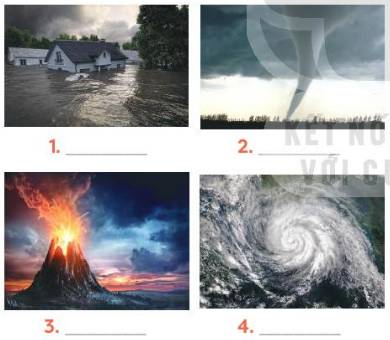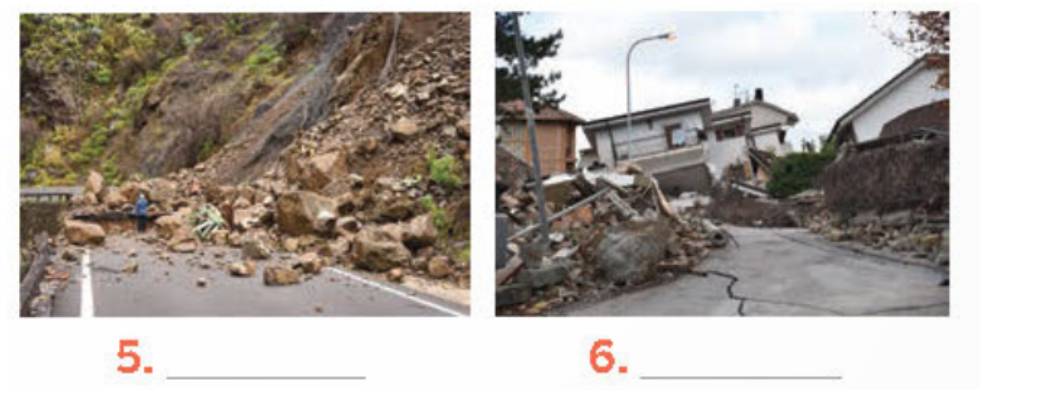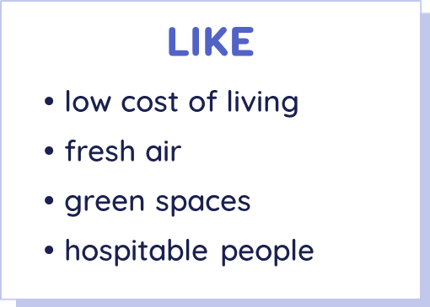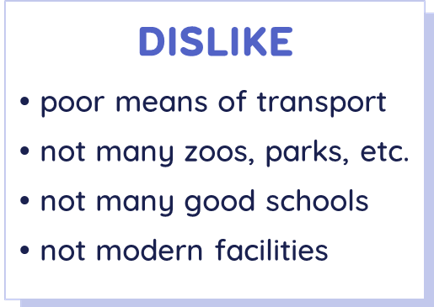Hãy nhập câu hỏi của bạn vào đây, nếu là tài khoản VIP, bạn sẽ được ưu tiên trả lời.

1. flood | 2. tornado | 3. vocalnic eruption |
4. storm | 5. landslide | 6. erathquake |

Living in the countryside is very unique. Although many people think that the country is not good or not well-provided, it's still one of the best options for healthy living. In the countryside, first, it's the low cost of living. Secondly, unlike the cities, the country provides fresh air and green spaces. Last but not least, the villagers are always kind and friendly, willing to help each other no matter what.
Some people really prefer to live in the downtown because of its facilities. But I prefer to live in the countryside because of many reasons.
First of all, the life in the city makes me uncomfortable, I cannot bear to live in cramped conditions with the hustles and bustles. We do not have fresh air to breathe, do not have a space for our children to play and for us to relax. It is really tiring and upset to wait for hours because of traffic jams.
Secondly, the pollution because of smogs and dusts and noise can make me feel sick. Moreover, I do not feel safe to live in the city because the criminal situations are rising. , We feel worried when we go out each time.
Thirdly, Nowadays, the conditions of the countryside are better and better, the gap between the cities and the countryside is narrowed day by day.
I love the silence, I love fresh air. I love the good relationships of people. so I love to live in countryside.

1:true
2:true
3:false
4: false
bài này lớp 5 cx làm đc
| Statements | True | False |
| 1. The writer has two close friends | x | |
| 2. They're in the same class | x | |
| 3. Mai s reading | x | |
| 4. Hanh s sport | x |

Exercise 1. Underline the most suitable future form in each sentences.
Why are you going to buy / will you buy a new mountain bike?
Don’t phone between 8.00 and 9.00. I’ll study / I’ll been studying then.
Look out! That tree will / is going to fall.
Let me know as soon as Louis will get / gets here.
Great news! Jean and Chris will come/ are coming to stay with us.
According to this timetable, the bus is going to arrive/ arrives at 6.00.
Can you call me at this evening, because I’ll / I’m leaving tomorrow.
If you arrive late at the sale, the best thing will go / will have gone.
Exercise 2. Put each verb in brackets into a suitable future form.
By the time we reach home, the rain will have stopped (stop).
This time next week I (lie) will be lying on the beach in Spain.
In ten years’ time I (work). will be working for a different company.
If we don’t get there by 6.00, Jack (leave) will leave
In July they (be married). will have been married for 20 years.
In the year 2500 a lot of people (live) will be living on the Moon.
When you get to the station, I (wait) will be waiting for you outside.
Don’t worried! The plane (land) will be landing/ will land/ is going to land in a moment.
By the time you come home, I (finish) will have finished. the decorating.
Come round between 8 and 9. We (watch). will be watching the match on TV then.
Exercise 3. Put each verb in brackets into a suitable future form.
When I (see) see you tomorrow, I (tell) will tell you my news.
As soon as we (get) get there, we (phone) will phone for a taxi.
I (go) will go to the library before I (do) do the shopping.
We (wait) will wait here until the rain (stop) stops
I (get) will get. £50 from the bank when it (open) open
After you (take) take the medicine, you (feel) will feel better.
You have to stay until you (finish) have finished your work.
I (let) will let you know the minute I (hear) hear the results.
Before we (paint) paint the wall, we (have).will have a cup of tea.
We (climb) will climb over the wall as soon as it (get) gets dark.
Exercise 4. Put each verb in brackets into a suitable future form.
Have you ever wondered what exactly (1) you will be doing (you do) in ten years time? Well, according to the computer expert Tom Vincent, computer (2) will be soon able (soon be able) to make accurate predictions about the future. Professor Vincent, from Cambridge,(3) will hold (hold) a press conference next week to describe the computer which he calls “the Computafuture”. “This computer can tell us what life(4) will be (be) , based on data describing last events”, explains Professor Vincent. For example, Computafuture can predict how many people(5) will live (live) in a parular area, or whether there(6) will be (be) a lot of rain during a parular period. Professor Vincent also believes that by the year 2050, computer (7) will have replaced (replace) teachers, and (8) will also be doing (also do) most of the jobs now being done by the police. “Computer are becoming intelligent all the time”, says Professor Vincent. Soon they (9) will be directing .(direct) traffic and(10) teaching (teach) our children. And telling us about the future.”




1. will be in progress
2. don’t use